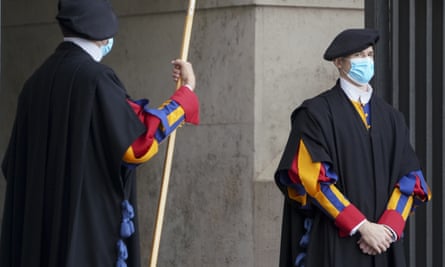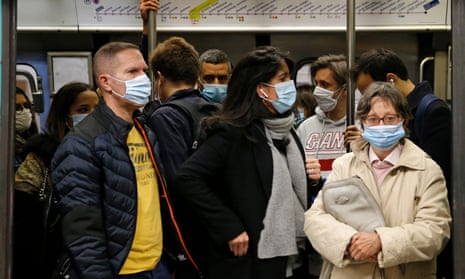France has said it may be forced to impose new lockdowns, Italy is expected to ban private parties, and the Czech Republic announced that it would close bars and shift most schools to distance learning as Europe’s second wave of Covid-19 continues to gather pace.
The moves came as the World Health Organization director general, Tedros Adhanom Ghebreyesus, warned that allowing coronavirus to spread in the hope of achieving so-called herd immunity would be “scientifically and ethically problematic”.
Last week, an international group of scientists called on governments to allow young and healthy people to return to normal life while protecting the most vulnerable. It later emerged that several supposedly expert signatories of the “Great Barrington declaration” were fake names.
Speaking on Monday, Tedros stressed that scientists still did not know how immunity is developed or how long antibodies remain in the body, and stressed that researchers were only beginning to understand the long-term impact of coronavirus. “Allowing a dangerous virus that we don’t fully understand to run free is simply unethical. It’s not an option,” he said.
The French prime minister, Jean Castex, on Monday called on people to limit gatherings in their homes, saying the country’s recent surge in new infections was placing its hospital system under increasing strain. President Emmanuel Macron is due to address the nation about possible further action to tackle the coronavirus on Wednesday.
“If over the next two weeks we see the indicators worsen, if intensive care beds fill up even more than we expect, we will indeed take additional measures,” Castex said, adding: “Nothing can be ruled out given what we’re seeing in our hospitals.”
He reiterated that “it should be possible” to avoid a second nationwide lockdown, but said the virus would be here “for several more months” and urged the French public to “respect protection measures” at home. “The only people who can regulate private spaces are the people themselves,” he said.
Too many people were failing to appreciate that “the second wave is here”, the prime minister added, noting that two more cities, Toulouse and Montpellier, were placed on maximum alert late on Sunday – bringing the total to nine.
In particular, he pointed to Paris and its suburbs, where agents carried out 500 checks over the weekend to ensure bars were closed as ordered and restaurants were ensuring social distancing measures, resulting in 95 fines.
The national health agency reported a record of nearly 27,000 new daily virus cases on Saturday, followed by more than 16,000 on Sunday. The percentage of positive tests also rose to 11.5%, double the rate of three weeks ago.
The director of the Paris regional health authority, Aurélien Rousseau, said the percentage of positive tests in and around the French capital had risen even further, to 17%, and the virus was spreading particularly quickly among young adults.
Castex acknowledged that the government’s homegrown StopCovid tracing app had been ineffective, with only 2.6m downloads since June, but said the government was working on a new version to be released on 22 October.
Italy, meanwhile, is planning to ban private parties and limit the numbers of guests at weddings and funerals among new restrictions aimed at curbing a surge in coronavirus infections, according to a draft decree seen by Reuters.
The decree, which could be issued as early as Monday, bars people from hosting more than 10 guests in their homes or in any other private premises and also states that no more than 10 guests will be allowed at weddings and no more than 15 at funerals.
Italy exceeded 5,000 new Covid-19 cases in a single day on Friday for the first time since March and daily infections remained above that level on both Saturday and Sunday. Covid-related deaths are much lower, normally below 30 compared with peaks above 900 a day at the peak of the pandemic.

In Rome, four Swiss Guards – who provide ceremonial guard duty and help protect 83-year-old Pope Francis – tested positive on Monday, the Vatican said. They are in isolation while their contacts are being traced.
In the Czech Republic, the health minister, Roman Prymula, said that bars, restaurants and clubs would be closed from Wednesday. Public gatherings will be limited to six people, alcohol consumption in public spaces will be banned, and masks will be required at public transport stops.
The announcement came after businesses, arts establishments and sports facilities demanded state support after the government announced new restrictions expected to do further economic harm, including the closure of theatres, cinemas and sport and fitness centres
The health ministry reported 59,920 active Covid-19 cases on Monday, with a daily record of 8,615 new infections reported on Friday. Hospital admissions over the past week have nearly doubled, forcing some to reduce non-urgent care.
Moscow began enforcing measures to keep a third of office workers at home, as Russia continues to report record numbers of new cases. The capital’s mayor, Sergei Sobyanin, said this week would be “decisive” in the capital’s fight against the virus.
“There are more and more people in hospitals, and the number of people in a very serious condition is increasing,” he said at the weekend, but insisted that a Russia-produced vaccine would be ready for “mass rollout” in the coming months.
Moscow imposed a strict lockdown in the spring but relaxed measures in June. On Monday it reported more than 13,000 new cases, bringing its total number of infections to about 1.3 million, with about 22,000 deaths registered.
More than 10,000 people have taken part in tests for Russia’s Sputnik V vaccine, the news agency Interfax reported. The president, Vladimir Putin, announced in August that the vaccine had been approved and was safe for use before it had passed the final stage of trials.
Outside Europe, Iran shattered its single-day record for new deaths and infections for the second day in a row, with 272 people confirmed dead and more than 4,200 new cases.
Recently reopened universities and schools, as well as libraries, mosques, cinemas, museums and beauty salons in the hardest-hit areas, have been ordered to close again, while since Saturday masks have been mandatory outdoors and in public places across Tehran, on pain of a fine.
